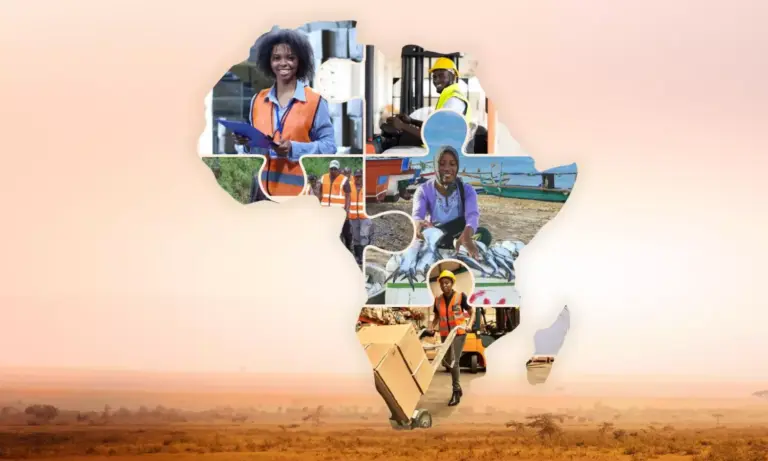AfCFTA Has the Potential to Boost Employment and Strengthen Africa’s Global Competitiveness
Africans are often quick to criticize their own leadership, economies, and even cultural nuances. However, the continent continues to make significant strides, particularly in intra-African trade. Decades ago, African countries rarely engaged in commerce with one another, but today, the story is changing.
According to Afreximbank, intra-African trade grew by 7.2% year-on-year in 2023, reaching $192 billion and accounting for 15% of total African trade, up from 13.6% the previous year. While this marks a notable achievement, African business leaders remain determined to push for deeper trade integration, break down barriers, and transform the continent into a unified economic powerhouse.
Recognizing the importance of addressing these trade challenges, Access Bank Plc hosted the inaugural Africa Trade Conference in Cape Town, South Africa. The event brought together industry leaders, policymakers, and trade experts to discuss solutions for accelerating intra-African trade and unlocking Africa’s economic potential.
Breaking Down Barriers to Trade
In his opening remarks, Roosevelt Ogbonna, Managing Director/CEO of Access Bank, highlighted key obstacles hindering intra-African trade, such as:
Limited access to capital
Market information gaps
Trust deficits between trading partners
Lack of modern trade infrastructure
He emphasized the urgent need for financial sector collaboration to create an environment where African enterprises can scale and compete globally.
“We must invest in initiatives that unite businesses, foster trust, and build trade connections. More importantly, we must challenge the narrative that ‘Made in Africa’ is inferior. We must buy Africa, wear Africa, and invest in Africa to propel the continent into the future,” Ogbonna stated.
Securing Capital for African Businesses
One of the biggest barriers to intra-African trade is the high cost of financing. While many African businesses have ambitions to scale, expensive and inaccessible funding limits their growth.
Ogbonna stressed the need for a financial services sector that empowers businesses by making capital more accessible and affordable:
“Many African businesses struggle to secure the right capital structure, and when they do, the cost is often so high that it makes competitiveness impossible. We need a network of African financial giants to provide homegrown solutions that enable businesses to expand across borders.”
Bridging the Market Information Gap
Beyond financing, another major challenge is limited access to market intelligence. Many African businesses lack the necessary data to identify trade opportunities beyond their local markets.
To bridge this gap, technology-driven solutions are crucial. Digital platforms can facilitate information-sharing, allowing businesses to make informed decisions and seize opportunities across the continent.
Rebuilding Trust in African Trade
A long history of inconsistent regulations and varying standards has contributed to a trust deficit among African businesses. Ogbonna called for harmonized trade standards and deeper regional cooperation to boost confidence in intra-African trade.
“We must reject the notion that African-made products are inferior. Investing in local industries and producing high-quality goods will shift perceptions and strengthen intra-continental trade.”
Upgrading Trade Infrastructure
Historically, Africa had well-established trade corridors linking it to the Middle East and Asia. However, inefficient transport networks and regulatory bottlenecks have made it easier for businesses in Angola to trade with Portugal than with Nigeria or South Africa.
Modernizing trade infrastructure is crucial. Africa must commit to building efficient transport networks and streamlining regulatory processes to facilitate seamless trade between nations.
The Role of AfCFTA in Africa’s Economic Transformation
With Africa’s population projected to reach 2.5 billion by 2050, the African Continental Free Trade Area (AfCFTA) is poised to be the most transformative economic initiative since the World Trade Organization (WTO).
Wamkele K. Mene, Secretary-General of AfCFTA, highlighted the agreement’s potential:
“AfCFTA is not just a trade agreement—it is a tool for Africa’s industrialization and economic sovereignty. By fully operationalizing it, we can eliminate trade barriers and create a self-sufficient, competitive, and prosperous Africa.”
Financing the Future of African Trade
Kanayo Awani, Executive Vice President of Afreximbank, emphasized the importance of trade finance solutions to support businesses expanding across borders.
“Trade finance is the lifeblood of economic development. Without it, businesses cannot scale, industries cannot innovate, and Africa cannot realize its full trade potential.”
Afreximbank has introduced the Pan-African Payment and Settlement System (PAPSS) to facilitate cross-border transactions, reducing reliance on foreign currencies and strengthening intra-African trade.
Driving Innovation and Policy Reform
At the conference, experts from Deutsche Bank, Traydstream, OWP Partners, Fiducia International, and others explored strategies for overcoming trade barriers through infrastructure improvements, digital solutions, and policy harmonization.
Honoring Trade Leaders and Innovators
The event concluded with an awards ceremony recognizing outstanding contributions to intra-African trade:
Tradepass Commodities Limited (Ghana), Chemaf International FZE (DR Congo), and Harvest Group of Companies (Zambia) – Recognized for supporting SMEs and women-led enterprises.
Bulkstream Limited (Kenya) & Electricidade de Moçambique (Mozambique) – Honored for advancing intra-African trade.
Tennant Metals South Africa Pty Ltd – Named as an Emerging Leader in Trade.
Afreximbank & IFC – Awarded for contributions to trade finance and economic development.
IHS Group, Dangote Industries Limited, and MTN Group Limited – Received the prestigious African Icon Award for their impact on the continent’s economic growth.
Conclusion: Africa’s Path Forward
The Access Bank Africa Trade Conference was a crucial step in fostering dialogue, building partnerships, and driving policies that will shape Africa’s economic transformation.
As Seyi Kumapayi, Executive Director of African Subsidiaries at Access Bank, reaffirmed:
“Africa’s future depends on collaboration, innovation, and creating a sustainable trade ecosystem that benefits all.”
By embracing AfCFTA, investing in infrastructure, and prioritizing intra-African trade, Africa can unlock new economic opportunities, create millions of jobs, and compete on a global scale.
The time to act is now. Africa must trade with Africa.

